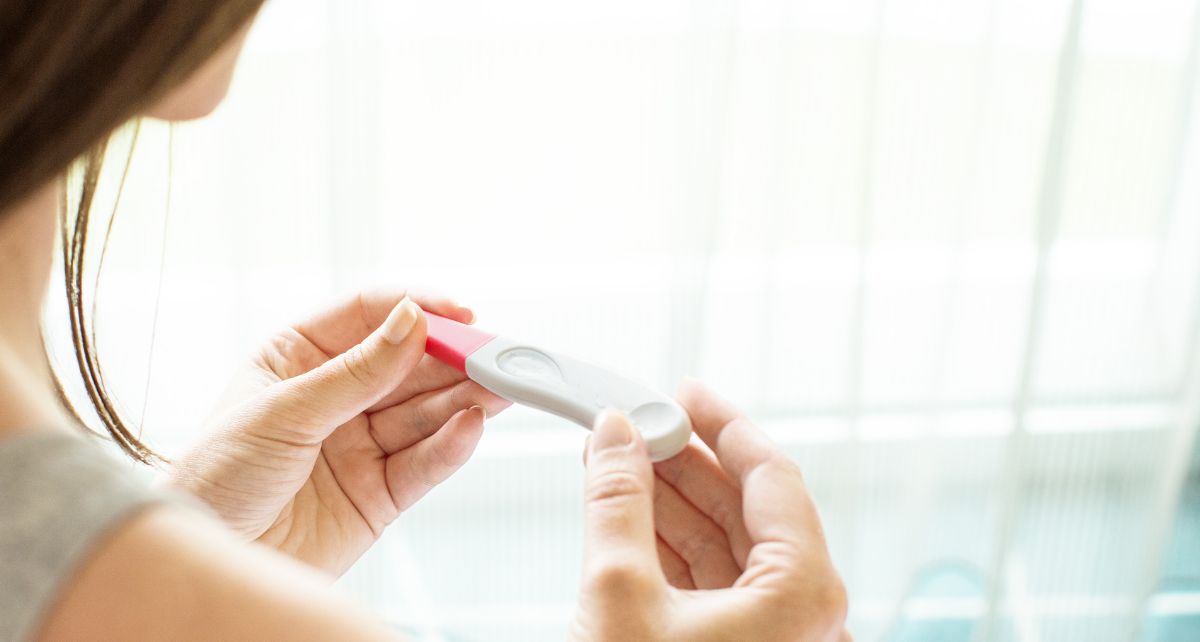Can you get pregnant on your period? Contrary to what many people believe, you aren’t fertile every day of your cycle. You’re only fertile a few days out of every month. Many people don’t know when those fertile days are and may be asking themselves ‘when can I get pregnant during my cycle?’ and ‘can I get pregnant while I’m on my period’? The simple answer: it’s not likely… but it’s possible.
The chance of getting pregnant on cycle day one is next to zero, but that chance may increase with each passing day. Let’s dive into when someone may be at risk of potential pregnancy when sexually active on their period.
Can you be fertile during your period?
For pregnancy to be possible, ovulation must have occurred. The egg released during ovulation is then viable for 24 hours to be fertilized by sperm, resulting in pregnancy. Even if you don’t ovulate during your period, there is still the possibility of pregnancy. This is because sperm can live for up to five days after they have entered the reproductive tract (vagina/uterus). This means if you had sex on your period, and ovulated a few days after your period ended, those sperm may still be alive to fertilize the egg released by the ovary.
The ‘fertile window’ is five days before ovulation plus the one to two days during ovulation². These are the days where there is a possibility of sperm surviving to reach an egg. This is why people with a shorter menstrual cycle (less than 24 days) may have a greater chance of conceiving while on their period as they may be ovulating sooner in their cycles.
Can you ovulate during your period?
Generally speaking, ovulation doesn’t happen at the same time as menstruation. Our period is a direct response from our previous cycle; when an egg is not fertilized, the uterus sheds the lining (our period), and then rebuilds the lining to prepare for ovulation to occur again. However, it isn’t impossible…
For somebody with an exceptionally long period week (7+ days), their body may still be bleeding/spotting when the body releases an egg for ovulation. In this case, pregnancy could be possible if ovulation occurred while the period was still tapering off.
Ovulation time can vary even in someone with a regular cycle and is much more variable in someone with an irregular menstrual cycle. There is a misconception that ovulation occurs around day 14 of the menstrual cycle for everyone, this may be the case for some, but not the majority. A study found that 70% of people who menstruate will either ovulate before cycle day 10 or after cycle day 17¹.
Unlike how a period may be predictable, ovulation can be harder to accurately predict. Many external factors affect if we ovulate sooner/later each cycle such as stress, sleep habits, and lifestyle changes. If something drastic happens in life the body may respond with early menstruation, as stress can bring on a period for some people. However, it isn’t stress just bringing on a period, rather stress bringing on ovulation sooner which then triggers a period to come sooner. Knowing how to track your cycle and look for signs of ovulation can help you determine if you are within risk of pregnancy.
Confusing period blood and ovulation bleeding
About 5% of people with periods will experience bleeding/spotting with ovulation³. For some, this may be enough spotting to be confused with a period. Using ovulation strips and tracking ovulation can help you determine between ovulation bleeding and menstrual bleeding. Fertility is highest the day before ovulation, and thus mistaking ovulation bleeding as menstrual bleeding and having unprotected sex could result in pregnancy.
Every person’s body and menstrual cycle is different. Someone’s cycle and ovulation timing may even differ month to month. While the chances of conceiving during your period are low, it’s important to be aware that it is a possibility, especially for those with irregular cycles. If you’re unsure about the level of protection you want to use for contraceptive purposes during your cycle, a health provider will be more than happy to go over further options with you.
References
1. Wilcox, A., Dunson, D., & Baird, D. (2000, November 18). The timing of the "fertile window" in the menstrual cycle: Day specific estimates from a prospective study. Retrieved April 02, 2021, from https://www.ncbi.nlm.nih.gov/pmc/articles/PMC27529/#:~:text=Among%20the%2069%20cycles%20for,22%20of%20the%20menstrual%20cycle).
2. Sperm: How long do they live after ejaculation? (2020, August 11). Retrieved April 02, 2021, from https://www.mayoclinic.org/healthy-lifestyle/getting-pregnant/expert-answers/pregnancy/faq-20058504
3. Dasharathy, S., Mumford, S., Pollack, A., Perkins, N., Mattison, D., Wactawski-Wende, J., & Schisterman, E. (2012, March 15). Menstrual bleeding patterns among regularly menstruating women. Retrieved April 02, 2021, from https://www.ncbi.nlm.nih.gov/pmc/articles/PMC3299419/
